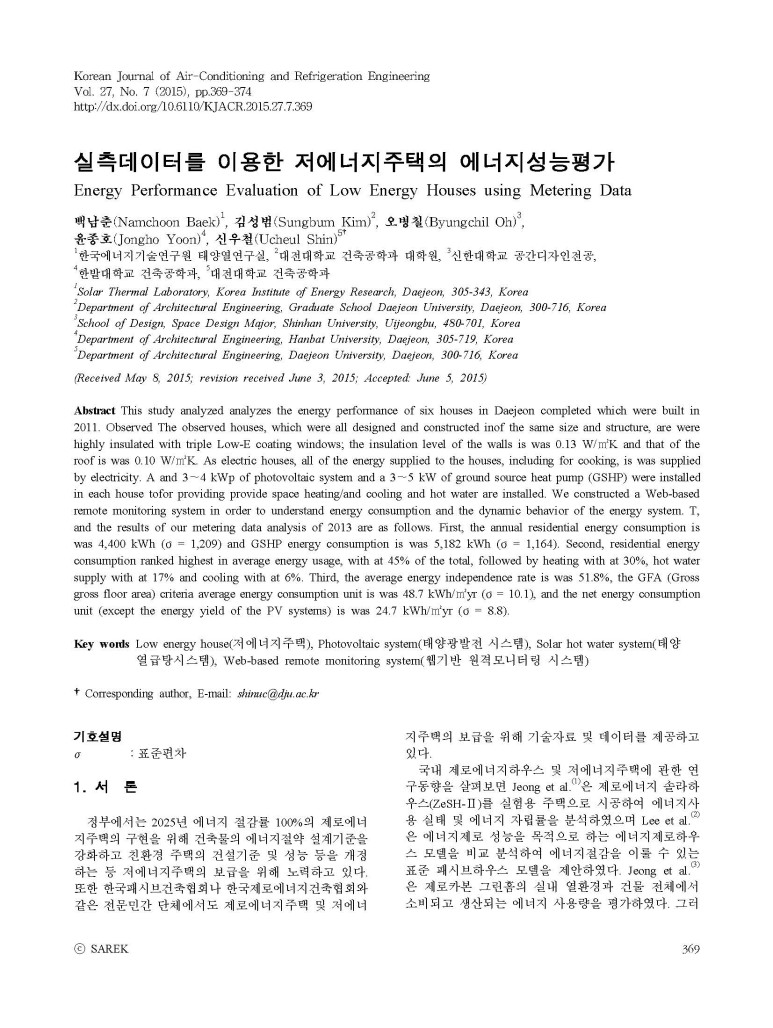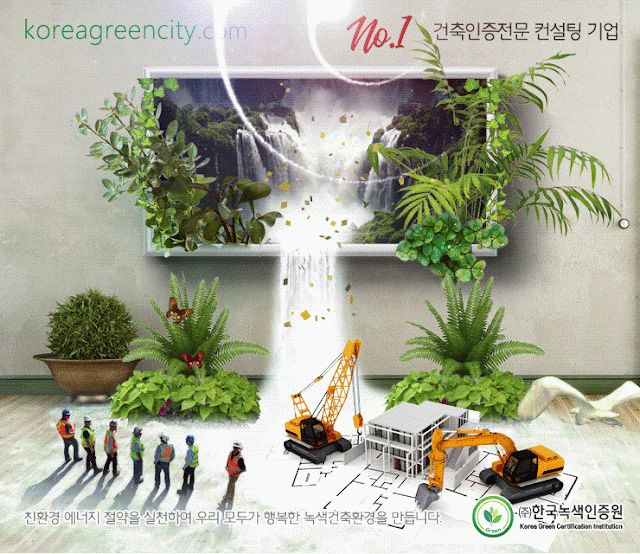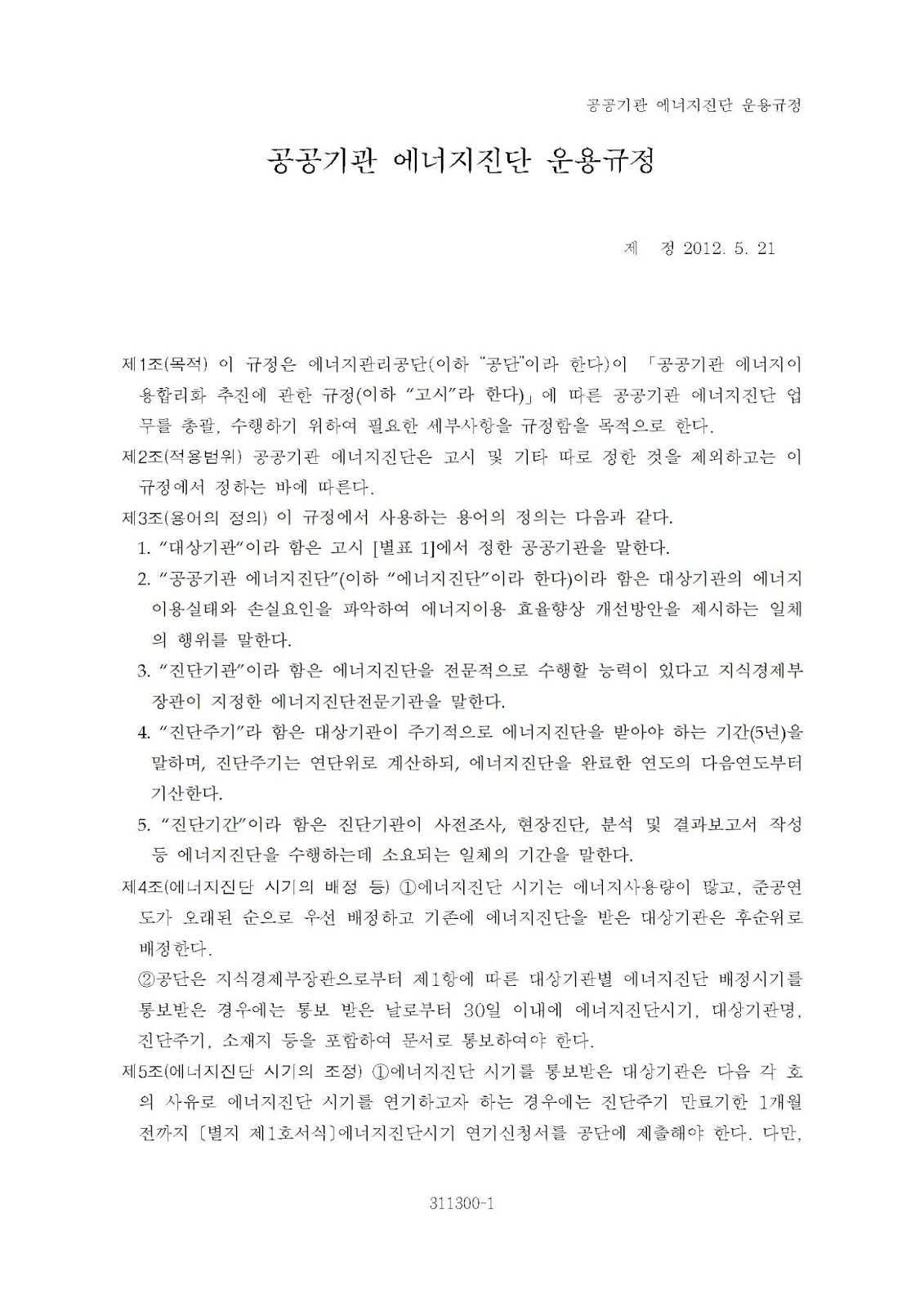실측데이터를 이용한 저에너지주택의 에너지성능평가
실측데이터를 이용한 저에너지주택의 에너지성능평가
Energy Performance Evaluation of Low Energy Houses using Metering Data
저자 백남춘, 김성범, 오병칠, 윤종호, 신우철
소속 한국에너지기술연구원 태양열연구실, 대전대학교 건축공학과 대학원, 신한대학교 공간디자인전공, 한밭대학교 건축공학과, 대전대학교 건축공학과
학술지정보 설비공학논문집 KCI
발행정보 대한설비공학회 2015년
자료제공처 국회도서관 KISTI 기계·건설공학연구정보센터 건축도시연구정보센터 한국연구재단
주제분야 공학 > 기타공학
<초록>
This study analyzed analyzes the energy performance of six houses in Daejeon completed which were built in 2011. Observed The observed houses, which were all designed and constructed inof the same size and structure, are were highly insulated with triple Low-E coating windows; the insulation level of the walls is was 0.13 W/㎡K and that of the roof is was 0.10 W/㎡K. As electric houses, all of the energy supplied to the houses, including for cooking, is was supplied by electricity. A and 3~4 kWp of photovoltaic system and a 3~5 kW of ground source heat pump (GSHP) were installed in each house tofor providing provide space heating/and cooling and hot water are installed. We constructed a Web-based remote monitoring system in order to understand energy consumption and the dynamic behavior of the energy system. T, and the results of our metering data analysis of 2013 are as follows. First, the annual residential energy consumption is was 4,400 kWh (σ = 1,209) and GSHP energy consumption is was 5,182 kWh (σ = 1,164). Second, residential energy consumption ranked highest in average energy usage, with at 45% of the total, followed by heating with at 30%, hot water supply with at 17% and cooling with at 6%. Third, the average energy independence rate is was 51.8%, the GFA (Gross gross floor area) criteria average energy consumption unit is was 48.7 kWh/㎡yr (σ = 10.1), and the net energy consumption unit (except the energy yield of the PV systems) is was 24.7 kWh/㎡yr (σ = 8.8).
This study analyzed analyzes the energy performance of six houses in Daejeon completed which were built in 2011. Observed The observed houses, which were all designed and constructed inof the same size and structure, are were highly insulated with triple Low-E coating windows; the insulation level of the walls is was $0.13W/m^2K$ and that of the roof is was $0.10W/m^2K$. As electric houses, all of the energy supplied to the houses, including for cooking, is was supplied by electricity. A and 3~4 kWp of photovoltaic system and a 3~5 kW of ground source heat pump (GSHP) were installed in each house tofor providing provide space heating/and cooling and hot water are installed. We constructed a Web-based remote monitoring system in order to understand energy consumption and the dynamic behavior of the energy system. T, and the results of our metering data analysis of 2013 are as follows. First, the annual residential energy consumption is was 4,400 kWh (${\sigma}=1,209$) and GSHP energy consumption is was 5,182 kWh (${\sigma}=1,164$). Second, residential energy consumption ranked highest in average energy usage, with at 45% of the total, followed by heating with at 30%, hot water supply with at 17% and cooling with at 6%. Third, the average energy independence rate is was 51.8%, the GFA (Gross gross floor area) criteria average energy consumption unit is was $48.7kWh/m^2yr$ (${\sigma}=10.1$), and the net energy consumption unit (except the energy yield of the PV systems) is was $24.7kWh/m^2yr$ (${\sigma}=8.8$).
 |
| 캡션 추가 |
저희 (주)한국녹색인증원은 '지속가능한 저탄소 녹색건축인증 기술연구소'의 전문기업으로 설립되어, 빠른 제도 변화와 변모하는 건설환경에 이바지하고자 합니다. (주))한국녹색인증원은 건축, 도시, 생태분야가 녹색건축물에 접목될 수 있도록 적절한 요소분석을 통해 에너지 절감형 건축, 자생적 생태환경, 온열환경, 빛환경의 면밀한 조사와 연구로 고객의 삶의 질 향상 및 더 나아가 인류의 존속성에 그 목적을 두고 있습니다. 한국녹색인증원은 친환경컨설팅 전문업체로 주택성능등급, 그린홈, 에너지소비총량제, 에너지성능지표검토서, 건물에너지효율등급, 장수명주택







(%EC%A0%9C19819%ED%98%B8)(20250501)001.jpg)
(%EC%A0%9C34657%ED%98%B8)(20240710)001.jpg)
댓글
댓글 쓰기